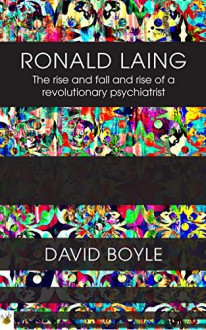
I’m writing this review as a member of Rosie’s Book Review Team. I was provided with an ARC copy of the book that I voluntarily chose to review.
I’m a psychiatrist and although I studied Medicine in Spain I have trained as a psychiatrist in the UK. Despite that, R.D. Laing and his ideas weren’t a part of our curriculum (I don’t know if things have changed now, as that was almost 25 years ago). During one of my training jobs, one of the psychotherapy tutors showed us a recording of an interview with R.D. Laing and he talked to us about him. He came across as a fascinating man with very interesting ideas, quite contrary to the standard focus on biological psychiatry, evidence-based interventions and emphasis on classification and symptoms rather than people. I read several of his books at the time and although I was fascinated by his ideas I didn’t have the time to study his figure and the rest of his work in detail.
This short book (the text takes up around 88% of the book as after that there are some extracts from other books from the same publisher, The Real Press) does an excellent job of highlighting both the person (the biography is succinct but it manages to include the salient points of his family life, his work experience and how both influenced his ideas) and his works. It also places Laing’s figure in its historical and socio-political era, linking it to other thinkers and movements of the time (hippy movement, antipsychiatry, existentialism, LSD culture…). Due to its length, it is not an exhaustive study of the individual works but it presents a good overview that will allow those who’ve never heard of R.D. Laing to gain some familiarity with his life and his work, and will bring together loose ends for those who might have read some of his works but don’t know how they fit into his career (because, as the author points out, some of Laing’s books are very difficult to understand). This text also provides a good guide to students interested in going deeper into Laing’s work and offers suggestions for further reading (both of Laing’s own works and of works about him). The book is being launched to coincide with the premier of a movie about Laing called ‘Mad to Be Normal’ starring David Tennant, and it should be a great complement to those who might come out of the movie intrigued and wanting to know more without embarking on complex theoretical books (that are very much of their time).
Boyle does a great job of extracting the most important aspects of Laing’s work and life and shows a good understanding and empathy towards the man and his ideas. Rather than focus exclusively on the most scandalous aspects of his life, he emphasises his care for patients, his own disturbed childhood, and how he insisted patients were unique and not just cogs in a machine that had to learn to show the required and accepted behaviour. Although many of his ideas have been discredited, his feelings about the profession and his insistence on listening to patients and putting their needs first resonate today as much as they did at the time. Personally, I’m pleased to see his figure is being re-evaluated. Never too soon.
Laing is one of these people whose life and scandals throw a big shadow over his work, but this book and, hopefully, the movie, might help new generations to rediscover him.

 Log in with Facebook
Log in with Facebook 





